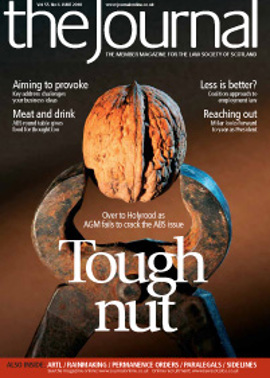It's the final countdown

Seventy three per cent of voters in the recent referendum on whether the Society should continue to have a dual function, representation and regulation said yes. The Society has been doing both for more than 60 years, but this refreshed mandate to continue operating this way, particularly in a demanding environment, is not to be underestimated.
It is particularly pertinent as 2010 sees the Society’s role in representing the profession and protecting the public extending to the introduction of the Law Society of Scotland Registered Paralegal scheme (“RP scheme”), in association with the Scottish Paralegal Association (SPA). The Society and SPA are committed to this voluntary scheme, which seeks to start to define and credit the role of the paralegal in Scotland – for paralegals, for solicitors, and crucially for the public who need to have faith in the knowledge and skills of the people dealing with their legal transactions.
There have been two major consultations on these developments since 2008. However, even if you have been following this work, you are now likely to be looking for answers to more detailed questions regarding how the scheme might impact on you.
This month in The Journal, the Society is hoping to answer some of the initial questions you might have, and to encourage you to log on to the Society’s website to find out more – whether you are a paralegal, solicitor, or working within HR in an organisation employing paralegals.
The Society can give general advice but will be unable to give detailed advice to individual paralegals until such time as a formal application is made.
For further information, visit www.lawscot.org.uk/paralegals
To receive updates straight to your inbox send an email with “OPT IN” in the heading to registeredparalegals@lawscot.org.uk
Law Society of Scotland Registered Paralegal Scheme, in association with Scottish Paralegal Association
10 facts about the scheme launch
1. The Registered Paralegal (RP) scheme is voluntary. This first phase will capture the expertise of a particular category of paralegal, creating a new standard – “Law Society of Scotland Registered Paralegal”.
2. The registered paralegal will work in a defined legal domain, or legal domains, in support of a supervising solicitor in delivering legal advice to clients.
3. Five legal domains have been created, and are called “guide areas”. These are in the areas of civil litigation: debt recovery, residential conveyancing, wills and executries, criminal litigation, and liquor licensing.
4. The Registered Paralegal Standing Committee, which will oversee applications for entry to the scheme, will authorise the creation of new legal domains where the market demands it, to a standard equivalent to the guide areas.
5. Transition – stage 1 is an opportunity for highly qualified members of the SPA, or other paralegal associations with directly equivalent standards, to be “grandfathered” into the scheme. It runs from 16 August 2010 to 15 November 2010.
6. Transition – stage 2 is a “window of opportunity” for any paralegal who feels they already meet the criteria associated with the RP scheme to make an application for a waiver from the requirement to follow the full route. Each case will be considered on its own merits. It runs from 16 November 2010 to 15 August 2011.
7. The “full route” will require a person to hold a relevant and formally assessed qualification relevant to their area of practice, then train for a year as a trainee registered paralegal, after which they qualify as a registered paralegal. This will be the only route to become a registered paralegal from 16 August 2011.
8. The scheme puts criteria in place to capture particular expertise in the profession, carried out by those using the term “paralegal”, and does not preclude a person who does not fall within the scope of the scheme from continuing with the valuable work that they do.
9. The Society is committed to ongoing evaluation of the success of the scheme, and looking at possibilities for expansion.
10. The Society is liaising with its partner SPA, and also other paralegal associations, in relation to their members who wish to be part of transition stage 1. The Society will also issue guidance notes and hold free roadshows for the profession prior to stage 2 commencing on 16 November 2010.
Who, what and why
More detail is available on the Society’s website, but some key questions are answered below.
Q. What is a registered paralegal (RP)?
A. Registered paralegals will meet a new standard for paralegals. Registered paralegals will:
- be qualified to a high standard, holding a formally recognised and assessed qualification relevant to their area of practice and having trained for a period of one year as a trainee registered paralegal;
- work in a particular legal domain, in support of a practising Scottish solicitor delivering legal advice to clients;
- work according to general competencies, and competencies specific to their particular legal domain;
- adhere to standards aligned with solicitors’ standards;
- comply with CPD and a complaints regime.
Q. Who is the RP scheme open to, and when can they apply to join?
A. The RP scheme is open to people who meet the criteria above, and is intended to complement existing quality marques in the profession.
See the section “10 facts about the 2010 Registered Paralegal scheme launch” for details of the three stages of launch, and the transitional arrangements which will apply to highly qualified paralegals during the first year of operation.
Q. What are the benefits to paralegals?
A. The most obvious benefit to being a registered paralegal is that a combination of strict entry criteria, robust standards, complaints and a CPD regime will mean that a defined professional status comes into existence and a defined career path for paralegals will emerge. Those on the register, and their employers, are essentially licensed to use the title “Law Society of Scotland Registered Paralegal” (and any appropriate grade, such as “Trainee”) after their names on notepaper, websites and promotional material. There are many associated benefits of the RP scheme, such as receipt of the Journal of the Law Society of Scotland, e-bulletin, and discounted CPD.
Q. What are the benefits to employers and supervising solicitors?
A. The high standards of the RP scheme provide solicitors with a highly qualified pool of registered paralegals in certain areas of legal work, from which they may elect to employ paralegals for that type of work. Whilst solicitors will retain overall responsibility for the work, they will be able to rely on the competence of a registered paralegal assisting them. There will be sanctions available through the scheme where a registered paralegal does not comply with registered paralegal standards.
Q. How much will the scheme cost and who covers that cost?
A. The cost is £100. The cost will be negotiated between the registered paralegal and their employer. Membership of the only independent organisation representing paralegals in Scotland and the Society’s partner in the Registered Paralegal scheme, the SPA, is included when you join the scheme.
Q. Is the cost a one-off payment or annual fee?
A. This is an annual fee.
Q. I do not work in one of the guide areas you have specified. Can I still become a registered paralegal?
A. See “10 Facts about the 2010 Registered Paralegal Scheme Launch” (above) for details. Legal domains are not intended to reflect individuals’ workloads. The standing committee will develop additional legal domains, if the market demands it, and to a standard which is equivalent to the guide areas.
Q. Having read details about the launch, I am not sure which stage of launch applies to me. How do I find out?
A. You should opt in to receive communications from the Society, and regularly visit the paralegal homepage for more detail on the criteria which apply to each stage. If you are a member of a paralegal association, you should also speak to them about whether they can support your application.
Professional Development Awards
The Scottish Qualifications Authority (SQA) is the national accreditation and awarding body in Scotland. They have developed a suite of Professional Development Awards (PDAs) designed to meet specific development needs of paralegals in Scotland. The PDAs are jointly awarded with the Scottish Paralegal Association.
These courses are nationally recognised, qualify for ILA funding to students, and are a welcome addition to the courses available, nationally, to those wishing to become paralegals in Scotland.
- For further information on the range of courses in different legal areas, contact Kevin Boyle of SQA at kevin.boyle@sqa.org.uk
- For information on ILA funding, visit www.ilascotland.org.uk
- For information on colleges delivering the HNC/HND in Legal Services, the PDA courses, and other qualifications qualifying for the scheme, visit the Society’s website at www.lawscot.org.uk/paralegals
In this issue
- Embrace "the new lawyer", mediation expert will tell conference
- Best practice governance for family businesses: a new dawn
- Spanning the divide
- Action on Gill review
- A House divided?
- Get it right first time
- Views from the front line
- Push for change
- "If ABSs are the answer, what's the question?"
- Common cause
- Shaping a new life
- Essential artl
- Smart bows out at AGM
- It's the final countdown
- Law reform update
- Ask Ash
- Here comes the rain again...
- True or false?
- Journey's end
- Win some, lose some
- Forget getting paid!
- Thumbs up for Google?
- A sporting result?
- Buying into good causes
- Scottish Solicitors' Discipline Tribunal
- Website review
- Book reviews






